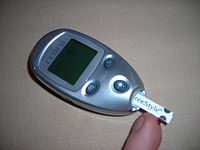
Photo from wikipedia
(1) Background: The increased risk of developing hypoglycemia and worsening of glycemic stability during exercise is a major cause of concern for patients with type 1 diabetes mellitus (T1DM). (2)… Click to show full abstract
(1) Background: The increased risk of developing hypoglycemia and worsening of glycemic stability during exercise is a major cause of concern for patients with type 1 diabetes mellitus (T1DM). (2) Aim: This pilot study aimed to assess glycemic stability and hypoglycemic episodes during and after aerobic versus resistance exercises using a flash glucose monitoring system in patients with T1DM. (3) Participants and Methods: We conducted a randomized crossover prospective study including 14 adult patients with T1DM. Patients were randomized according to the type of exercise (aerobic vs. resistance) with a recovery period of three days between a change of groups. Glucose stability and hypoglycemic episodes were evaluated during and 24 h after the exercise. Growth hormone (GH), cortisol, and lactate levels were determined at rest, 0, 30, and 60 min post-exercise period. (4) Results: The median age of patients was 53 years, with a median HbA1c of 7.1% and a duration of diabetes of 30 years. During both training sessions, there was a drop in glucose levels immediately after the exercise (0′), followed by an increase at 30′ and 60′, although the difference was not statistically significant. However, glucose levels significantly decreased from 60′ to 24 h in the post-exercise period (p = 0.001) for both types of exercise. Glycemic stability was comparable prior to and after exercise for both training sessions. No differences in the number of hypoglycemic episodes, duration of hypoglycemia, and average glucose level in 24 h post-exercise period were observed between groups. Time to hypoglycemia onset was prolonged after the resistance as opposed to aerobic training (13 vs. 8 h, p = NS). There were no nocturnal hypoglycemic episodes (between 0 and 6 a.m.) after the resistance compared to aerobic exercise (4 vs. 0, p = NS). GH and cortisol responses were similar between the two sessions, while lactate levels were significantly more increased after resistance training. (5) Conclusion: Both exercise regimes induced similar blood glucose responses during and immediately following acute exercise.
Journal Title: International Journal of Environmental Research and Public Health
Year Published: 2023
Link to full text (if available)
Share on Social Media: Sign Up to like & get
recommendations!